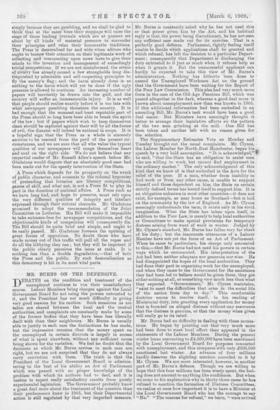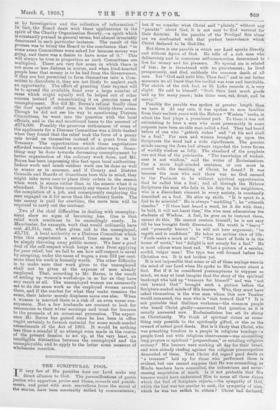MR. BURNS ON THE DEFENSIVE.
DEBATES on the condition and treatment of the unemployed continue to run their unsatisfactory course. Labour Members bring charges against the Local GOvernment Board for not using the powers entrusted to it, and the President has not much difficulty in giving very good reasons for his caution. Such measures as are taken are shared between the local and the central authorities, and complaints are constantly made by some of the former bodies that they have been less liberally dealt with than their neighbours. Mr. Burns is usually able to justify in each case the distinctions he has made, but the impression remains that the money spent on the unemployed in certain districts is largely in excess of what is spent elsewhere, without any sufficient cause being shown for the variation. We feel no doubt that the decisions at which Mr. Burns arrives in each case are right, but we are not surprised that they do not always carry conviction with them. The truth is that the President of the Local Government Board is adminis- tering to the best of his ability an Act of Parliament which was passed with no proper knowledge of the problem with which its authors had to deal, and it is useless to expect really satisfactory results from purely experimental legislation. The Government probably know a great deal more about the treatment of the question than their predecessors knew in 1905, but their Departmental action is still regulated by that very imperfect measure, Mr. Burns is constantly asked why he has not used this or that power given him by the Act, and his habitual reply is that, the power being discretionary, he has not seen any sufficient case made out for its exercise. That is a perfectly good defence. Parliament, rightly feeling itself unable to decide which applications shall be granted and which refused, has left the decision to a particular Depart- ment ; consequently that Department is discharging the duty entrusted to it just as much when it refuses help as when it grants it. But the unsuccessful applicant can hardly be expected to take this view of Mr. Burns's administration. Nothing has hitherto been done to amend the Unemployed Workmen Act on the ground that the Government have been waiting for the Report of the Poor Law Commission. This plea had very much more force in the case of the Old-Age Pensions Bill, which was passed altogether in the dark, whereas a good deal more is known about unemployment now than was known in 1905. If this additional information had been embodied in an amending Bill, Mr. Burns's task would have been a good deal easier. But Ministers have seemingly thought it better to arrange their legislative efforts on the pattern of the two men grinding at the mill. Oue Bill has been taken and another left with no reason given for the selection.
The Supplementary Estimates Vote on Monday and Tuesday brought out the usual complaints. Mr. Clynes, - the Labour Member for North-East Manchester, began his speech by a very bold assumption. " It is acknowledged," 1P he said, " that the state has an obligation to assist men who are willing to work, but cannot find employment in the ordinary market." The only acknowledgment of this kind that we know of is that embodied in the Acts for the relief of the poor. If a man, whether from inability to • find work or from any other cause, is unable to support himself and those dependent on him, the State on certain strictly defined terms has bound itself to support him. It is an obligation unknown in most other countries—it does not exist, for example, so near home as Scotland—hut is laid on the community by the law of England. As Mr. Clynes seemingly understands the term, it exists only in his vivid imagination. What the State has taken upon itself, in addition to the Poor Law, is merely to help local authorities or Committees to make special provisions for temporary distress arising from want of work in winter. Judged by Mr. Clynes's standard, Mr. Burns has fallen very far short of his duty ; but the inaccurate utterances of a Labour Member have not yet the force of an Act of Parliament. When he came to particulars, his charge only amounted to this,—that Mr. Burns had not used his powers in certain ways which he enumerated. His interpretation of the Act had been neither adequate nor generous nor wise. He had disappointed the hopes of the local authorities. They had done their part in organising work for the unemployed, and when they came to the Government for the assistance they had been led to believe would be given them, they got either nothing at all, or something very much less than what they expected. " Governments," Mr. Clynes maintains, "exist to meet the difficulties that arise in the social life of the nation from day to day." This comfortable doctrine seems to resolve itself, in his reading of Ministerial duty, into granting every application for money that is founded. on alleged distress without any assurance that the distress is genuine, or that the money when given will really go to its relief.
Mr. Burns had no difficulty in dealing with these accusa- tions. Ho began by pointing out that very much more had been done to meet local effort than appeared in the statements of the Labour Members. During the present winter loans amounting to £4,360,000 have been sanctioned by the Local Government Board for purposes connected with unemployment, and this compares with only £306,000 sanctioned last winter. An advance of four millions hardly deserves the slighting mention accorded to it by Mr. Clynes. We are more interested, however, iu another part of Mr. Burns's defence. Though we are willing to hope that this four millions has been wisely spent, the feel- ing does not amount to anything like confidence. But when we come to his explanation why in thirty-three cases he has refused to sanction the formation of Distress Committees, we realise at once how important it is to have a Minister at the Local Government Board who has the courage to say "No." " The reasons for refusal," we learn, " were arrived at by Investigation and the collection of information." In fact, the Board dealt with these applications in the spirit of the Charity. Organisation Society,—a spirit which is constantly praised in general terms, but almost invariably denounced in.each particular instance. The result of the process was to brink the Board to the conclusion that " in some areas Committees were asked for because money was going, and there was a desire to have some of it." This will always be true in proportion as such Committees are multiplied. There are very few, areas in which there is not more or less distress in winter, and when kind-hearted people hear that money is to be had from the Government, if they are but permitted to form themselves into a Com- mittee to distribute it, they are not likely to neglect such an opportunity. The effect of granting their request will be to spread the available fund over a large number of cases which might equally well be helped out of other sources instead of concentrating it on genuine cases of unemployment. Nor did Mr. Burns's refusal finally close the door against relief even in these thirty-three areas. Though he did not see his way to sanctioning Distress Committees, he went into the question with the local officials, and in the end sanctioned loans to the amount of £174,000. Possibly the generous enthusiasm of some of the applicants for a Distress Committee was a little dashed when they found that the relief took the form of a penny rate levied on themselves instead of a grant from the Treasury. The opportunities which these negotiations afforded were also turned to account in other ways. Some- thing may be done towards decreasing unemployment by better organisation of the ordinary work done, and Mr. Burns has been impressing this fact upon local authorities. Indoor work and much outdoor work can be done as well in winter as in summer, and if County and District Councils and Boards of Guardians bore this in mind, they might take more care to place their orders iu the season when work is scarce rather than in the season when it is abundant. Nor is there commonly any reason for hurrying the completion of a job, and consequently employing the men engaged on it for more than the ordinary hours. The less money is paid for overtime, the more men will be required to carry out the contract.
Two of the chief difficulties in dealing with unemploy- ment show no signs of becoming less. One is that relief work continues to be exceedingly costly. In Manchester, for example, work that would ordinarily, have cost ..£1,815,. cost, when given out to the unemployed, £5,712. A local authority or a Distress Committee which tries this experiment a second time seems to us to be simply throwing away public money. We hear a good deal of the self-respect which keeps a man from applying for poor relief, but we fail to see how self-respect is saved by accepting, under the name of wages, a sum 312 per cent. more than his work is honestly worth. The other difficulty is to make sure that work given to the unemployed shall not be given at the expense of men already employed. That, according to Mr. Burns, is the result of setting up women's workshops iu so far as they have auy result at all. The unemployed women are necessarily set to do the same work as the employed women around them, and if the market for what they make remains the same, their labour .merely displaces seine one else. When a woman is married there is a risk of an even worse con- sequence. Not a few husbands are content to look for necessaries to their wives' earnings and trust for luxuries to the proceeds of an occasional procession. The experi- ence Mr. Burns has gained since he has been in office ought certainly to furnish material for some much-needed amendments of the Act of 1905. It would be nothing less than a scandal if no attempt were made in the course of the present Session to set up, at the very least, an intelligible distinction between the unemployed and the unemployable, and to apply to the latter some measure of wholesome coercion.















































 Previous page
Previous page